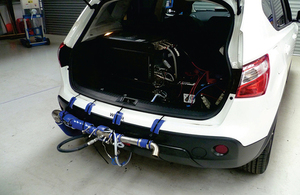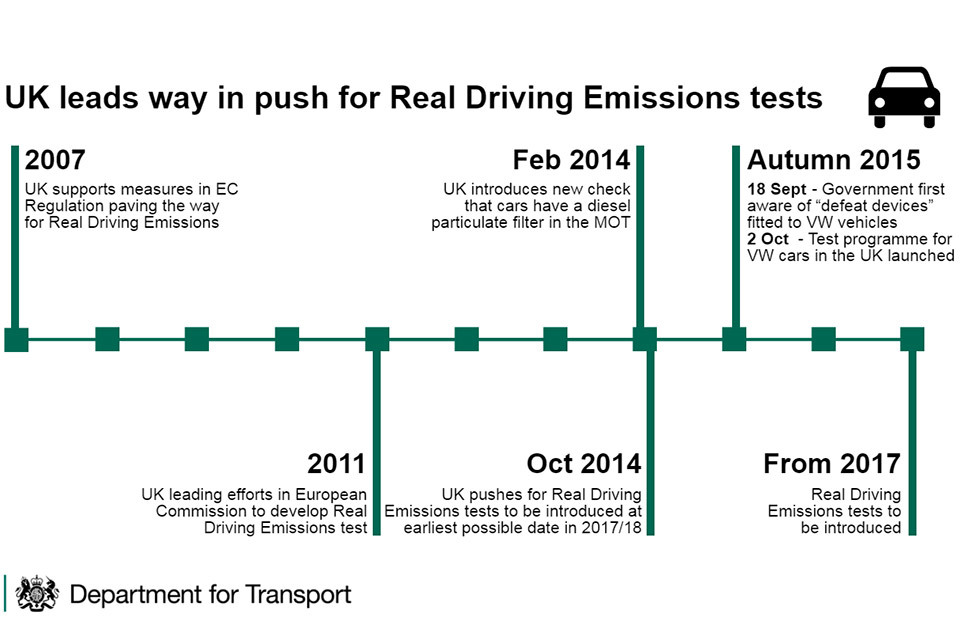Government publishes findings of diesel emissions testing programme
Vehicles tested in the UK programme showed no evidence of car manufacturers, apart from the VW Group, fitting devices to defeat the approved emissions test programme.

Portable emissions measurement system (PEMS) installed in a test vehicle.
- real driving emissions tests to be introduced from 2017
- UK testing has been carried out alongside an investigation by the German Ministry for Transport
Today (21 April 2016) the UK government published its research into emissions levels from leading diesel car models, fulfilling a commitment to consumers to investigate potential manipulation of emission controls.
The tests have not detected evidence of test cycle manipulation strategies as used by the Volkswagen (VW) Group. Tests have provided further evidence that nitrogen oxide (NOₓ) emissions are higher in real world conditions and on the test track than they are in laboratory conditions. This was the case for all manufacturers’ vehicles, with results varying significantly between different makes and models.
Tests have been carried out on a total of 56 different vehicle types in Germany and 37 different vehicle types in the UK, over a period of 6 months. The Vehicle Certification Agency on behalf of the Department for Transport tested a representative selection of the UK’s top selling diesel vehicles. The findings provide a snapshot of exhaust emissions from those diesel models when tested in the laboratory, on a test track and during typical road use.
Existing lab tests designed to ensure emission limits are met have been shown to be inadequate and this is why the UK has secured a tough new Europe-wide ‘real driving emissions’ test. From next year, vehicles will have to meet emissions limits in real driving conditions across a wide range of typical operating temperatures. This will improve consumer confidence in manufacturers. The UK will be working to ensure that the new rules for real driving emissions and type approval are robust, deliver the expected outcomes and that manufacturers behave consistently.

Timeline for introduction of real driving emissions tests.
Even before the introduction of the new limits, the UK government has been urging manufacturers to introduce new technologies to reduce emissions sooner than the new EU regulations require. Some manufacturers have announced that they intend to make changes to vehicles already in use to improve emissions, and will offer this to customers on a voluntary basis. The UK government welcomes this and encourages action from other manufacturers.
Today’s report provides a valuable insight into car emissions and will inform the ongoing work being done by the UK, Germany and across Europe to improve the testing of new vehicles.
Next month the government will present the research published today to European Research for Mobile Emission Sources, the body responsible for collating vehicle emission data, to inform their updated emissions factors later this year. This will ensure EU-wide emission factors more accurately reflect the difference between real world driving and laboratory test conditions.
The Secretary of State for Transport, Rt Hon Patrick McLoughlin MP, said:
Our tests published today have not detected evidence of manipulation of emissions lab tests as used by the VW Group by any other car manufacturer.
The tests do show the widespread use of engine management systems to prevent engine damage which can lead to higher emissions in real world temperature conditions cooler than those in the approved lab test.
The UK has been leading in Europe in pushing for real world emissions tests which will address this problem. Real world tests will be introduced next year to reduce harmful emissions, improve air quality and give consumers confidence in the performance of their cars.
Following the Volkswagen emissions scandal the whole of the automotive industry must work hard to restore public trust by being transparent about the systems they employ and advancing plans for introducing cleaner engine technology.
News desk enquiries
Media enquiries 0300 7777 878
Switchboard 0300 330 3000